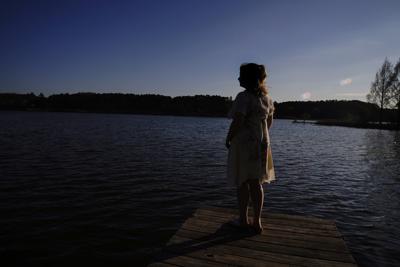- Monday, 16 February 2026
Why are teen girls in crisis? It's not just social media
New York, Apr. 20: Anxiety over academics. Post-lockdown malaise. Social media angst. Study after study says American youth are in crisis, facing unprecedented mental health challenges that are burdening teen girls in particular. Among the most glaring data: A recent Centres for Disease Control and Prevention report showed almost 60% of U.S. girls reported persistent sadness and hopelessness. Rates are up in boys, too, but about half as many are affected.
Adults have theories about what is going on, but what do teens themselves say? Is social media the root of their woes? Are their male peers somehow immune, or part of the problem?
The Associated Press interviewed five girls in four states and agreed to publish only their first names because of the sensitive nature of the topics they discussed. The teens offered sobering — and sometimes surprising — insight.
“We are so strong and we go through so, so much," said Amelia, a 16-year-old Illinois girl who loves to sing and wants to be a surgeon. She also has depression and anxiety. Like 13% of U.S. high school girls surveyed in the government report, she is a suicide attempt survivor. Hospitalization after the 2020 attempt and therapy helped. But Amelia has also faced bullying, toxic friendships, and menacing threats from a boy at school who said she “deserved to be raped."
More than 1 in 10 girls said they’d been forced to have sex, according to the CDC report, the first increase noted in the government’s periodic survey. Sexual threats are just one of the burdens teen girls say they face.
“We are trying to survive in a world that is out to get us," Amelia said.
Emma, an 18-year-old aspiring artist in Georgia with attention deficit disorder and occasional depression, says worries about academics and college are a huge source of stress.
“Lately in myself and my friends, I realize how exhausted everyone is with the pressures of the world and the social issues and where they’re going to go in the future," Emma added. ”All of these things pile up and crash down."
Zoey, 15, was raised in Mississippi by a strict but loving single mother who pressures her to be a success in school and life. She echoes those feelings.
“School can be nerve racking and impact your mental health so much that you don’t even ... recognize it, until you’re in this space where you don’t know what to do," Zoey said. She’s also had friendship struggles that ended in deep depression and felt the discomfort of being the only Black kid in class.
Several girls said they face added pressure from society’s standards that put too much focus on how they look.
“A lot of people view women’s bodies and girls’ bodies as sexual," Emma said. “It’s overwhelming to have all these things pushed on us."
The #MeToo movement began when these girls were quite young, but it intensified during the pandemic and they’re hyperaware of uninvited sexual advances.
Boys are less aware, they suggest. The girls cite crass jokes, inappropriate touching, sexual threats or actual violence. Girls say the unwanted attention can feel overwhelming.
“We deserve to not be sexualized or catcalled, because we are kids," Amelia said.
Siya, an 18-year-old in New Jersey, said almost every girl she knows has dealt with sexual harassment. “That’s just been the normal for me,” she said.
“When you’re walking alone as girl, you’re automatically put in this vulnerable situation," Siya said. “I think that’s so sad. I don’t know what it feels like to not have that fear.” (AP)
















